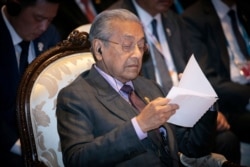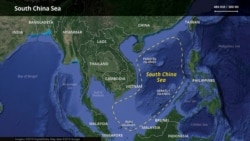China and Malaysia, old friends with a complex trade and investment relationship, are disagreeing over Malaysia's rights to extend sovereignty into part of a disputed sea that's rich in fossil fuel reserves.
On Dec. 12, the Southeast Asian nation submitted documentation to the U.N. Commission on the Limits of the Continental Shelf about plans to extend its rights over the South China Sea beyond 370 kilometers from its baselines. The documentation, linked to a related application that Malaysia and Vietnam made 10 years ago, met with opposition from China's U.N. mission. China claims about 90% of the sea.
The government of Malaysian Prime Minister Mahathir Mohamad is reviewing the country's rights offshore with an eye toward asserting any that involve Beijing because other countries are resisting Chinese expansion now too, analysts say. The United States particularly opposes China's maritime expansion and, to that end, gives military support to Chinese rivals in Asia.
Malaysia's challenge, although it doesn't mention China by name, could eventually tease out more aid from Beijing while expanding its foothold in a contested sea where other countries have made gains in the past.
"They're looking at all this really hard-core pressure against the Chinese and seeing it's a potential strategic window to probably exploit more financial aid, more development aid from China," said Stephen Nagy, senior associate politics and international studies professor at International Christian University in Tokyo.
"They're exerting the pressure at the right time, understanding it's in line with the other states in the region rather than being an outlier," he said.
Old friends
Malaysia's former prime minister, Najib Razak, whose coalition lost parliamentary elections in 2018 to Mahathir's camp, seldom criticized China and instead accepted Chinese funding for domestic infrastructure projects despite fears among Malaysians about too much Chinese economic influence.
As of mid-2018, Malaysia had racked up about $34 billion in loans for projects under the Belt and Road Initiative, China's $1 trillion program to build trade-related infrastructure in nearly 70 countries extending into Europe. In 2017, China contributed 7% of the total $13.6 billion that Malaysia received from other countries.
Mahathir has been more outspoken, although on the whole careful to save the friendship despite the long-standing maritime sovereignty dispute that has seen Chinese coast guard ships sail into the contested waters. In April he called on the Communist leadership to define its "so-called ownership" of the sea.
Review of relations
Mahathir's government last year froze a Chinese-funded gas pipeline and a $20 billion railway project, also aided by China. It's looking now at all the country's rights and obligations offshore, said Oh Ei Sun, senior fellow with the Singapore Institute of International Affairs.
Malaysia has lost access at sea to Indonesia and Singapore by responding too late in the past, Oh said.
"I think this administration, after learning that kind of experience, they've tried to be safe on the legal side," he said. "The Mahathir administration, I think, is in the process of reviewing all its rights and obligations and when necessary, it would file these sort of claims in a more timely matter."
The prime minister sees a chance to increase sway over China in future talks over the terms of development aid, said Alan Chong, associate professor at the S. Rajaratnam School of International Studies in Singapore. Malaysia hopes to get concessionary loans and use domestic labor for Chinese-funded projects.
"I think that Malaysians are trying to create leverage for future negotiations with China, because Mahathir is a more independent-minded character than his predecessor so he's playing a shrewder game," Chong said.
China hopes to avoid arbitration
Malaysia, the Philippines, Brunei, Vietnam and Taiwan contest all or parts of China's sovereignty claims over the 3.5 million-square-kilometer sea stretching from Hong Kong to Borneo. Malaysia is the biggest explorer for natural gas under the seabed.
It's not only Malaysia pushing back. Vietnam is expected to harden its stance toward China next year as chair of the 10-member Association of Southeast Asian Nations, while people in the Philippines want their government to step up opposition to China over their maritime disputes. The U.S. government, among others, helps some of the Southeast Asian maritime claimants militarily.
China lost world court arbitration in 2016 to the Philippines over the legal basis for the Chinese so-called "nine-dash line" claim over the sea. China uses this U-shaped line to demarcate its claims in the South China Sea. Beijing cites historic records to back its claims and has rejected the arbitral ruling. It hopes to avoid a 2016 repeat involving Malaysia, Oh said.
"The Commission on the Limits of the Continental Shelf should continue to exercise prudence when handling those submissions on the outer limits of the extended continental shelf that involve a land or maritime dispute and perform its functions ... in particular the rule that any submission that involves an unresolved dispute shall not be considered," Chinese Ambassador Wu Haitao told a U.N. general assembly on Dec. 12.










